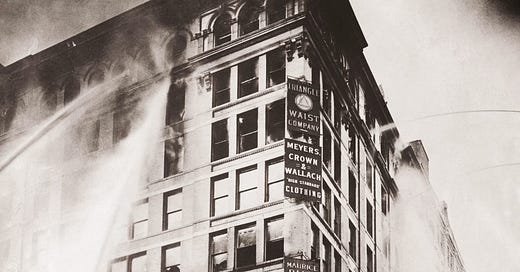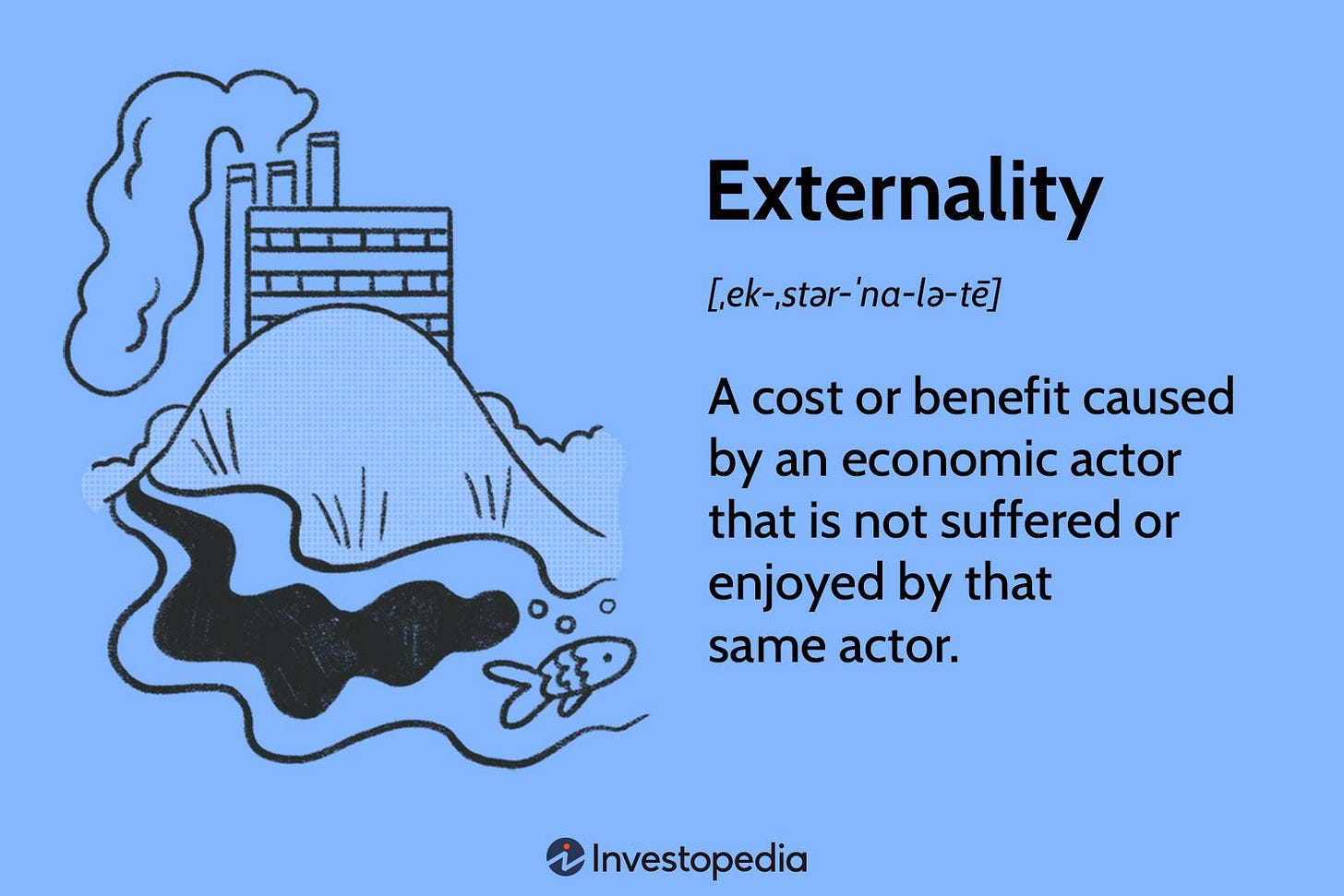[POST] Tragedies are essential to legislation in a democracy
Look at almost any significant law and you will discover a preceding tragedy that willed it into being
This is a reader-supported publication. I give it all away for free but could really use your support if you want me to keep doing this.
American democracy has a fairly clear rule-set on making up new rules: tragedies are totally fair game. Conversely, for those who oppose the envisioned new rules, tragedies must be met with merely “thoughts and prayers” — lest they be “politicized” (i.e., become an item of political interest).
The Guadalupe River Disaster is but the latest flashpoint in this long American history, which many historians like to trace back to the infamous Triangle Shirtwaist Factory Fire of 1911.
From Wikipedia:
The Triangle Shirtwaist Factory fire in the Greenwich Village neighborhood of Manhattan, a borough of New York City, on Saturday, March 25, 1911, was the deadliest industrial disaster in the history of the city, and one of the deadliest in U.S. history. The fire caused the deaths of 146 garment workers—123 women and girls and 23 men—who died from the fire, smoke inhalation, falling, or jumping to their deaths. Most of the victims were recent Italian or Jewish immigrant women and girls aged 14 to 23; of the victims whose ages are known, the oldest victim was 43-year-old Providenza Panno and the youngest were 14-year-olds Kate Leone and Rosaria "Sara" Maltese …
Because the doors to the stairwells and exits were locked—a common practice at the time to prevent workers from taking unauthorized breaks and to reduce theft—many of the workers could not escape from the burning building and jumped from the high windows. There were no sprinklers in the building. The fire led to legislation requiring improved factory safety standards and helped spur the growth of the International Ladies' Garment Workers' Union (ILGWU), which fought for better working conditions for sweatshop workers.
Oh, yeah, you can bet there were officials back then who decried the “politics” of it all, chastising anyone for offering anything other than thoughts and prayers for the poor unfortunates, but this is how democracy learns.
In a democracy like the US, you’re pretty much free to do anything that isn’t outlawed. Those laws typically arise in the aftermath of some externality emerging (unforeseen negative downstream cost of some activity).
Pollution is the classic externality in a free market: I get rich destroying something of collective value, like a river. But, until that externality is recognized publicly (often just locally), with action popularly demanded, then that new law won’t come into existence. Hence, politicizing the tragedy or disaster is entirely appropriate and a key function of our democracy — as in, one state’s godawful tragedy becomes another state’s wisely preemptive new rule.
Thus, politicizing the tragedy is how we identify the needed solution — the squeaky wheel calling out for oiling (or, in a more modern sense, the brake pad designed to squeal when used to signal it is at the end of its useful life).
Yes, Americans often disagree on what is a tragedy and what is not, with abortion being the prime example (“body autonomy” versus “murder”), and so those rule-set fights drag on and on (my entire lifetime, basically).
But just as important as ultimately solving the question of where my legitimate freedoms end when they bump up against your legitimate freedoms is to first identify and call out and thoroughly examine the tragedy at hand. This is where the press is crucial, and public officials, when they are so challenged, will often resort to blaming the press for the unfair or inaccurate designation (This isn’t a tragedy. That’s the kind of language only losers employ!). These officials’ counter-offer? Just look at all the lives that were saved by these here heroes! Shouldn’t we concentrate on that “win” and stop exploiting the grief of those who lost loved ones?
But, of course, the whole point of bringing all these issues to light is to ensure something like this doesn’t happen again.
And what is the threshold there? That is entirely subject to debate in a democracy, but my rule of thumb is this: the new rules become appropriate whenever the public’s judgment of any deadly event arrives at the instinctive conclusion that Nobody should have to die like that.
In other words, it just feels wrong that lives were lost, because this was entirely preventable.
We accept all sorts of deadly outcomes with aplomb. You want to hang-glide off some mountain? People get killed that way, you know? You want to go into outer space? It will always be a somewhat risky proposition. Driving a car comes with inherent threats to life and limb.
But working in a factory where the owners are making good money and not taking sufficient care of their workers?
Nobody should have to die like that.
Dying of cancer from pollution put into an environment by factory owners who know full well what they’re doing?
Nobody should have to die like that.
It’s a simple test of what you can stomach, and that metaphor is entirely apt to a democracy — What we can collectively stomach.
If the collective wrongness of something hits you like a punch in the stomach, then new rules are both inevitable and good.
On something like oil and gas fracking, we can collectively stomach a certain amount of environmental damage or disruption. But when it gets so bad for enough people in an important-enough political district, then the rules will come, whittling that damage down to the point where even the locals can stomach the price/inconvenience/threat when measured against the economic gain. It is, by definition, a balancing act.
So, no, there are no magic thresholds that always apply in every situation, thus we, in a democracy, are constantly experimenting with the balance of freedom left — at first — to those willing to attempt new things. Until resulting externalities are recognized, we pretty much let the entrepreneurs have their way, the shared assumption being we will all benefit from such experimentation and innovation over time (a key tenet of a market democracy).
Any great wave of innovation brings with it a great wake of tragedies that must be suitably processed. So, those who declare Now is not the time! These people have it completely backwards. Tragedies and disasters are exactly the time to politicize the underlying situation, because that is a primary driver of progress in a democracy. To say otherwise, then, is essentially anti-democratic — sort of an elite FU to the masses (Go pray while us adults decide!). It is entirely insulting and constitutes its own attempted de-politicization of the tragedy.
From the NYT story:
The question facing Gov. Greg Abbott of Texas at a news conference on Tuesday was whether he would call for an investigation into possible failures surrounding the deadly floods, which include a lack of state and local spending on flood control measures and warning systems.
To answer, Mr. Abbott said asking about blame was “the word choice of losers,” and then invoked a beloved Texas tradition — football — as he deflected questions about accountability for a disaster that has left at least 111 people dead and more than 170 missing.
“Every square inch of our state cares about football,” Mr. Abbott said, referring to the Friday night lights of high school fields and the state’s college and pro teams. “Every football team makes mistakes,” he added.
Extending the metaphor further, the governor said losing teams assigned blame while championship teams responded to mistakes by saying: “We got this. We’re going to make sure that we go score again, that we win this game.”
Abbott, seeking to deflect any blame assigned to the state and his administration, is basically saying, Leave this response to us professionals and don’t ask any uncomfortable questions that challenge our performance or authority. In other words, shut up and take the hit, Texas.
The irony?
The governor doth protest too much.
On average, Texas is exemplary on disaster management.
Texas, due to its size and geographic diversity, frequently faces natural disasters such as hurricanes, floods, and wildfires. The effectiveness of Texas's state government in disaster response is routinely scrutinized—both by the public and policy experts—especially following major events.
This is how we improve things.
Texas has consistently invested at both state and local levels in emergency management infrastructure, communication systems, and responder training. It is not a stretch to say that Texas is a national and even global leader in this regard.
In the recent floods, state and local officials coordinated hundreds of rescues within hours, deploying resources across multiple agencies and making aggressive efforts to aid affected communities. So, yeah, there were “wins” to be had, but 200-or-so likely dead in the end? There is no way to spin that as a “win” in any sport analogy.
Based on what it learned from past tragedies and disasters, Texas uses a tiered response system, beginning with local response and escalating to a coordinated state-level response as incidents grow in complexity. The state leverages a network of trained personnel, prepositioned equipment, and ongoing hazard monitoring to support timely responses, turning to FEMA only when things get really bad. Republicans are correct when they say that this is how FEMA was originally designed to function — as a federal backup to robust state responses.
If every state was as solid on this score as Texas, we wouldn’t be having this debate. But that’s simply not the case. Moreover, the disasters we collectively process as a Union are getting bigger and more complex and more damaging and longer and more frequent — due to climate change. Worse, the shifting of climates across our continent is forcing new challenges upon states unused to dealing with Problems A,B, and C because those sorts of problems haven’t historically reached these states — until now, thanks to climate change.
Texas is plenty practiced on this subject. It actively utilizes the Emergency Management Assistance Compact (EMAC), which allows for rapid resource and personnel sharing with other states, supplementing the state’s already substantial disaster-management assets.
This is why, while Texas prides itself on a strong state-led approach, the state regularly works closely with FEMA and other federal partners (to the tune of $15 billion in FEMA aid from 2011 to 2024). Rest assured, the rest of the Union is paying into Texas more disaster relief than Texas is paying out to the Fed.
So yeah, the entire country has the right to politicize this tragedy for all the best reasons.
Texas, as we will inevitably discover, is a far from perfect “football team.” The recent floods and responses they triggered indicate that investments in communication infrastructure, especially in rural areas, have been woefully inadequate, meaning this tragedy was entirely preventable but wasn’t prevented.
The country is also collectively learning — right up to the Oval Office — that FEMA is worthy keeping. Texas is a big state but suffers big disasters as a result. A prime reason why our states have joined in this Union is to spread the risk of such events. FEMA is that federal action officer — that great socializer of state risk.
In general, FEMA and DHS have highlighted Texas's preparedness and effective use of federal grants as models for other states, but that reality doesn’t obviate the state’s frequent need for federal assistance. Same logic applies to California, the difference here being Texas is a Red/MAGA state and so Trump goes out of his way to be helpful while doing the opposite whenever the Golden State (deep Blue) suffers something similar.
Dastardly? Such politicization of the response is entirely un-American and indicates a level of disdain for our Union that is disturbing and dangerous to our freedoms.
Climate change, wished out of federal existence by Trump 2.0, is only going to stress our Union and its members that much more in coming years and decades, and, yeah, there is no more front-line state than Texas.
This is why Texas needs to seriously learn from this disaster. That’s the responsibility it undertakes whenever it takes in federal disaster-relief funds: the rest of us are paying Texas to know better and do better because nobody should have to die like that.








In the military, we had a saying: Regulations are written in blood. Unfortunately, that made a lot of sense.
~"American democracy has a fairly clear rule-set on making up new rules: tragedies are totally fair game. Conversely, for those who oppose the envisioned new rules, tragedies must be met with merely “thoughts and prayers” — lest they be “politicized” (i.e., become an item of political interest)."~
Who decides the rule-set?
Their name, address, social security number, family members...
~"In a democracy like the US, you’re pretty much free to do anything that isn’t outlawed."~
Dracon's Wager (or Solon's Wager) – eventually, you run out of things to outlaw, making life unbearable & prone to a spiral of ethical autocannibalism backed by law enforcement itself, public (police...) or subterfuge (intelligence agencies...).
This mentality is a letimotif why Europe is at a stalemate, using the confiscation powers of the purse (one's own money), to fines, to force shape-sifting behavioural changes, is equivalent to killing them without drawing blood. Legalized bloodletting, that kills silently, cowardly some might say.
Well, well, well, well, well... Where did this got Europe, and the rest of the world, into? How damaged in the head are the people of Europe alone with this purview?
Exactly, exactly.
~"Yes, Americans often disagree on what is a tragedy and what is not, with abortion being the prime example (“body autonomy” versus “murder”), and so those rule-set fights drag on and on (my entire lifetime, basically).
But just as important as ultimately solving the question of where my legitimate freedoms end when they bump up against your legitimate freedoms is to first identify and call out and thoroughly examine the tragedy at hand."~
This is an unfortunate side-effect inherited from the Old Continent/Old World™; of the various ideological fights of who can screw the other faster, quicker, and without noticing (nobility v. democracy; 1st born v. 2nd/nth born; roman catholicism v. reform; elitariat v. proletariat, pharaohs v. slaves; royalty v. freemasonry; etc.).
When you use the dialectic of power(s) to shape the world based upon your personal/familial problems, it becomes a literal competition of who can shape-shift reality (or issues) to a grandstanding that ignores the interests of the grandstand itself, more often than not harming it entirely.
To use your example, two politicians – one pro-abortion and one pro-natalist/deathism – are using the "debacle" because they want to influence their, more often than not, children's behaviour or personal relationships.
A pro-abortion politician is such because, due to fears of potential natural consequences, doesn't want/need an [un]official spouse and a kid, presumably.
A pro-life/death politician is such because, due to fears of potential natural consequences, doesn't want their kid (most often than not, daughters) to screw around and 'shame' the power daddy or and mommy is positioned at, to be perceived as gnawed because "daddy's/mommy's kiddo" couldn't be controlled in time. Control, yet again...
This power dialectic is why the world, not just the US alone, is how it is.
Instead of one, let it be all options.
But nah, due to power tripping reveleations, even that becomes a leninist "who, whom" death spiral, just because one hates the cut of their opponent(s) jib – and viceversa, eventually.
Are we happy with this power dialectic?
Are we really, not lying to ourselves about this tragedy of the commons' sense(s)?
~"But working in a factory where the owners are making good money and not taking sufficient care of their workers? Dying of cancer from pollution put into an environment by factory owners who know full well what they’re doing? It’s a simple test of what you can stomach, and that metaphor is entirely apt to a democracy — What we can collectively stomach.
If the collective wrongness of something hits you like a punch in the stomach, then new rules are both inevitable and good."~
Q.E.D.
~"Climate change, wished out of federal existence by Trump 2.0, is only going to stress our Union and its members that much more in coming years and decades, and, yeah, there is no more front-line state than Texas.
This is why Texas needs to seriously learn from this disaster. That’s the responsibility it undertakes whenever it takes in federal disaster-relief funds: the rest of us are paying Texas to know better and do better because nobody should have to die like that."~
Check the archives, very recent, these natural disasters were expected since May, if not late April: the 'Omega Block' weather pattern.
Texas sacrificed, to save democracy in the Middle East?
Again, back to the dialectic of power(s) fragment, just above. The more one uses the not liking the cut of one's jib, the deeper you too all end in the gutter, punching, dragging each n' everyone, deeper worse than gehenna.
In geopolitics, at least in Eastern Europe, we were advised to "not wash our national dirty clothes out in the open" in the bigger open forum at the EU level, some 15 years or so ago.
Bad/Self-harmful advice, or...?